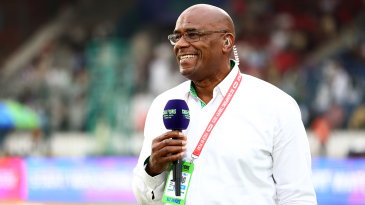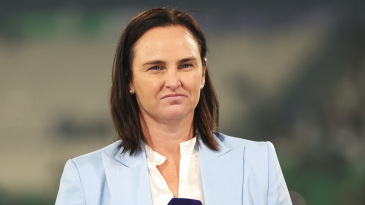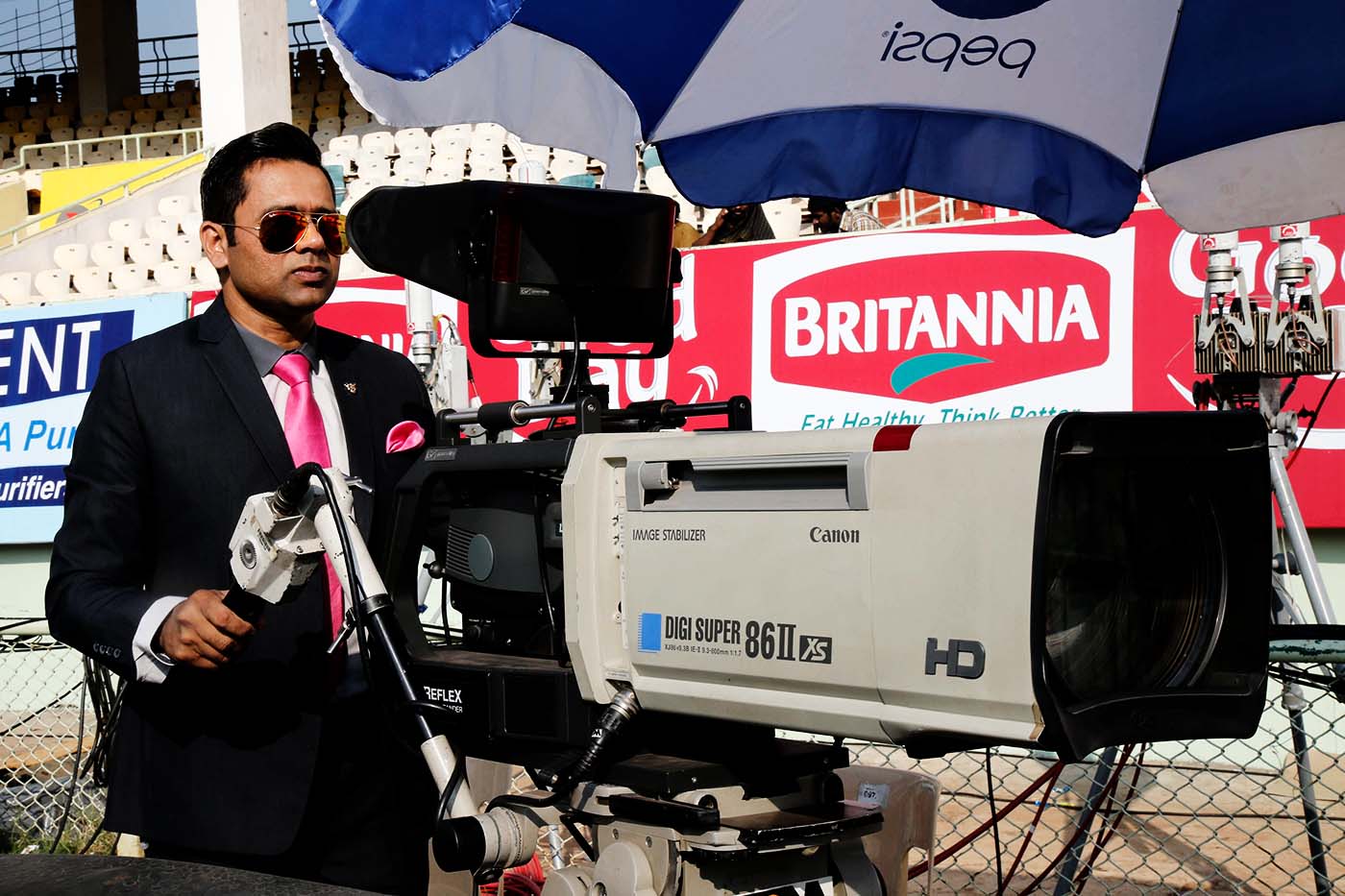
The camera is my friend: Chopra has forged a successful second career in cricket as a broadcaster

The camera is my friend: Chopra has forged a successful second career in cricket as a broadcaster
The former India batter delves into the challenges of dealing with trolls and with players unhappy at being criticised
Aakash Chopra played ten Tests for India and continued playing domestic cricket for nearly a decade more, during which time he began a second career in the media, including writing columns for ESPNcricinfo. He is now a well-known television commentator and a popular YouTuber. In this interview, he talks about how he went about learning the art of broadcasting and figuring out what works with the digital audience - sometimes by accident and sometimes by design.
I want to start with the success of your media journey. Have you ever taken stock to appreciate: look at what I've made here in your YouTube channel Akaashvani, and in the media in general for the last 10-15 years?
I'm not just being humble for the camera, but I genuinely feel that God has been very, very kind here, because I did not plan it this way. I did not expect this to happen. In fact, the day I was contemplating retirement from cricket, I remember sitting with Aakshi, my wife, in Dubai. We were taking stock of things. Where will we go? What will we do?
I said, see, we can talk about cricket, we can write about cricket. I should do a coaching course, because that's one thing that most former cricketers are supposed to do. So I did a Level 1. Then I thought: [a career for me in] international cricket commentary is not going to happen. We were counting the number of people who were there [commentating] already. And there was [commentary in] only one language - English. This was in 2013. I said, see, Sourav [Ganguly] has retired, Anil [Kumble] has retired, VVS [Laxman] has retired and Rahul [Dravid] has retired. And the ones who are [currently] commentating are not going to retire. So there is no chance I'll get a gig.
Because I was in Delhi and a lot of news channels were around, I would go there. That was an easy thing to do, but [not one that would] sustain a livelihood. So I [thought], I will do a coaching course and I'll continue to write. But writing is a labour of love. It doesn't pay the bills as much. I have written four books, but you don't make money out of it.
"I was trying to be an honest commentator, but some people must have felt I crossed the line"
You wrote for ESPNcricinfo at the time. You took the journalistic path to media. That is not a common path.
I think it was a predestined kind of thing. In Delhi, I was looking for a job. I was at an insurance company who wouldn't allow me to play. They wouldn't give me leave to play. And I was playing for India A. They said: go without leave.
So for 18 months, I didn't get paid. One day Mr [Arun] Jaitley [then president of the Delhi and District Cricket Association and a union minister] asked me, "Aakash, is there any problem with you?" I said, "Sir, job chahiye [I need a job], because where I'm working right now, they don't pay me at all." He spoke to Shobhana Bhartia [chief executive of the Hindustan Times newspaper]. They offered a job to me and Gautam Gambhir. Gauti didn't take that job. I took it. It was 2003-04, just before I played for India. The money was quite decent.
It was a three-year rolling kind of contract. They don't ask me to do anything. I'm just there. I'm getting paid every month. Now, this cannot go on for too long. If I'm continuously playing for India, and they get me for certain gigs, it's okay. But I'm not contributing anything to this organisation at all, so it may last one cycle, maybe another and that will be over. What will I do? By that time I'll be fairly old to get another job.
I went to England to play club cricket [in the Central Lancashire League in 2004]. Rahul [Dravid] had already penned some articles when he had gone [in 2003 to play for] Scotland. That became the inspiration that I should start writing something, otherwise they [Hindustan Times] will kick me out. So then I scribbled through the [English] summer and that [became] a fortnightly column for Hindustan Times.
And then I think Sambit [Bal, editor] at Cricinfo saw what I was writing. I met him in England. He said: "Why don't you write for us as well?" I was just talking technique, technique, technique. He said, "You should write pieces on technique." Once again, it was not by design. I started writing technical pieces because that was something that came naturally to me, because I actually grew up at a club where the focus on technique was too much.
You're talking about Sonnet Cricket Club in Delhi?
Yes, everything was about technique, that you must get everything right, so I had a fair idea of how to get it right. Whether I could do it or not, I don't know. But I knew these were the mechanics and I started writing like that.
 "I feel very blessed I played cricket for India. A lot of people would not even recognise the face. I was always under the helmet. But as a commentator, I have seen banners and posters and whatnot in the crowd for me"
"I feel very blessed I played cricket for India. A lot of people would not even recognise the face. I was always under the helmet. But as a commentator, I have seen banners and posters and whatnot in the crowd for me"

Even as a domestic cricketer before you played for India, you were very confident about your view of the game - technical acumen, the obsession with mechanics, the science of the game.
Yes, yes. In fact, that might be true for everybody who played for Sonnet at that point in time. Because Ustad ji [Sonnet cricket coach Tarak Sinha] was really focused on getting things right. If you played for Sonnet, you were told in as many words: you will get only one chance. If you were technically compact, you would make that one chance count.
All of us at that point were quite deeply focused on the technique of the game, so that when there is this ultimate test and you get an opportunity to play for Delhi, at whichever level, you will make that one chance count.
For those who may not know, the legendary Tarak Sinha coached many cricketers, men and women, Aakash included: Ashish Nehra, Anjum Chopra… Rishabh Pant.
Imagine! But that's the beauty of the coach who [that he coached both] me and Rishabh Pant. Ajay Sharma, Manoj Prabhakar, Raman Lamba, Sanjeev Sharma, Atul Wassan, Bhaskar Pillai. It's a long, long list.
In many ways, you were learning two things: one, to play the game, and the other, you were being filled with knowledge, which, in your case, through your skills of articulation, has become your livelihood today.
Yes, so one thing led to the other is what I'll say. Even while playing cricket, I used to keep a diary on a daily basis [to record] what I was doing. Recently, that diary came to light. My dad found it. I was 15-16 [when I wrote it].
What is in this diary?
Every game I played, I would write: This happened today. I got dropped twice. I was playing across the line. Things like that. So one thing led to the other when the Hindustan Times [job] happened.
When I went to England, I realised that if I have to write, I must also read. I had plenty of time, so I got the membership of a local library. I started reading so much.
Chopra (sitting) with Rahul Dravid (centre) and Yuvraj Singh on India's 2003-04 tour of Pakistan
KM Chaudhry / © Associated Press
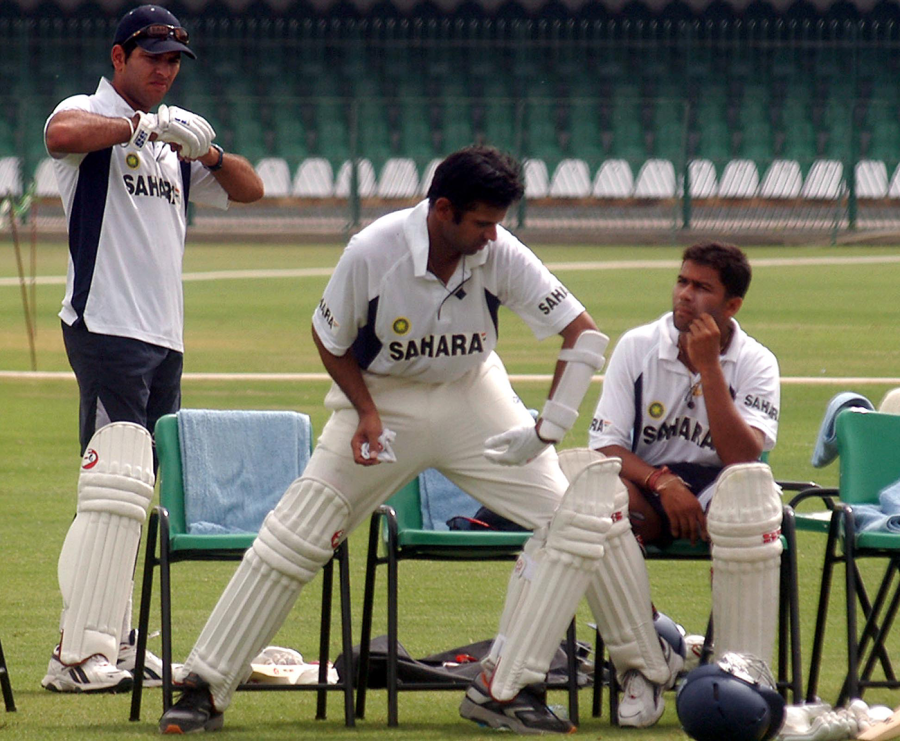
What kind of a student were you?
I was a very good student, actually. Outstanding because I had this photographic memory. I could remember things, and that's how you could crack the CBSE [Central Board of Secondary Education exams]. I actually topped my 12th [standard] also. I got a scholarship.
But then actually to write - these are two very different things, I realised. So I read a lot of fiction. I read JK Rowling, all seven books, one after the other. Harry Potter is still right up there. [I understood that] if I were to write, I must read and understand writing, because writing was the only [alternative to cricket as a profession] thing at that point.
So reading remains a big passion?
I read much less these days, for a variety of reasons. I consume a lot of intelligent content. I have moved to audiobooks.
From the years that I've had the good fortune of working with you, every time we meet, we talk cricket. Is it fair to say that even outside of cricket, your interest has remained cricket?
For the longest time. While I was playing, yes, it was all about cricket and nothing beyond that. Except say, JK Rowling, most of the books that I read at that time - and I read quite a bit - were all focused on getting better as a cricketer. So whether it's Andre Agassi's Open or Nasser Hussain's Playing with Fire. Sport books, self-help books, like Tough Times Never Last, But Tough People Do!.
Would you say your appetite for cricket is a bit extraordinary?
Not really. Over the years, I've become smarter. I have a young family and I spend time with my kids as well, so I don't watch everything. Now I understand what I need to watch and what I need to curate. It's almost like reverse-engineering: okay, I need to talk about this, so I must watch that. Everything else I may just follow, but then I choose not to talk about it. I know my audience. That's one thing I've learned: that this is my audience, this is what they want from me, so keep delivering that and find a way to deliver better.
"I won't be prescriptive on commentary because I haven't played 100 Tests. I'll lean on an expert"
You were thinking that a career in commentary wouldn't happen because there was only one language. But then came another language: Hindi. All India Radio's Hindi commentary was around for years and years, but Hindi-language commentary on mainstream TV broadcasts changed the game around the time of your retirement.
Yes, absolutely. Again, a God-sent opportunity. I was writing for Cricinfo when Star Sports was planning to start a programme called Star Power [in 2013]. They wanted a guy who had a deep analytical mind and they wanted him to be an in-house resource. That opportunity came to me because the person who was hiring [for it] had gone through my articles. He said: "You have to come work for us. Come to Mumbai."
So I moved to Mumbai, not knowing at the time that I'd be commentating. I came to Mumbai to work on a show.
[In 2010], I had moved from Delhi to [to play for] Rajasthan. I ended up winning two titles for Rajasthan and only one for Delhi.
Moving from Delhi to Mumbai was a tough decision. It was also a one-year contract. My daughter was only nine months old, so for us to move to a new city with a baby was going to be tough, but we said: okay, let's do this. The whole idea was, if I'm working almost every day, then I need to be close to my family. I can't be staying in a different city.
We tend to have our opinions on commentators and how much we like or don't like them. But very few people actually get to see the amount of work that goes behind putting content out. And I can say this without a doubt: your drive for putting out content is second to none. I have heard from multiple people in the industry about how professional you are. And then you also go do your own solo work.
Once again, it was not by design. It may sound like I'm being too modest.
So I moved to Mumbai and then I stayed on beyond that one year. That was a slightly difficult call to make because Star had said, you can go back because we are shutting down the show [Star Power]. And my Hindi commentary career hadn't taken off properly at that time.
My wife and I decided to stay put for another six months. I got enough work in six months, with Star and elsewhere, so I said, it makes sense to be around.
When was your YouTube channel, Akaashvani, born?
It was born in February 2018. And it was born because I was already recording so much [for television] that I thought, okay, might as well record something for myself.
So you started putting out content on your own social media handles?
I called it Akaashvani [literally meaning "voice from the sky"; it's also another name for All India Radio, India's state-owned radio broadcaster]. There was no rhyme or reason behind it. If I'm recording 23 questions [for television], [I'd ask the producer to] just record three more for me. We would not even edit it. We'd just put it out there. They were like three-minute bite-sized content, which actually YouTube would tell you back in the day: don't put it out, because the algorithms are going to drown it and not pick it up at all. And I decided - again, I don't know why - to put it up at 7am.
You knew the value of being a content creator or an influencer pretty early.
I don't know whether I understood it well or not. I can't claim to say that I did that because I knew what was going to happen.
We started putting up unedited clips. We had no sponsor, and there was no reason for us to put it out at 7am. And within a couple of weeks, we realised that [on a] day we didn't put out anything, there were comments asking: What happened? Where is it? Are you okay? I was like, wow, this is incredible, because it was basically me and my nephew [doing it all]. I said, now that people are watching, let's edit something, so he would edit some pictures here and there.
When people actually embraced it, I felt obligated. Then I started doing it on holidays [as well], again, without a sponsor. There was no money coming, YouTube money was very little at that point in time.
Chopra covering the 2023 WPL with former cricketers Parthiv Patel and Reema Malhotra (third and fourth from left)
Ron Gaunt / © BCCI
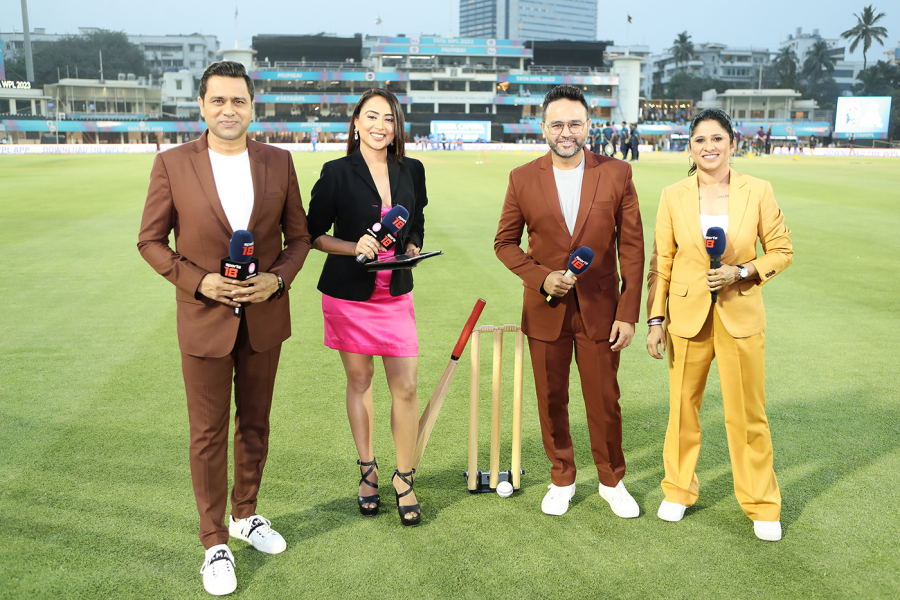
It's quite extraordinary, because as the media landscape changed, appointment viewing became redundant. But in an organic sort of way, you created an audience of people consuming your content, so that on the day you didn't do it, they missed you.
That's the only thing that keeps me going. After a very long day of [commentary] work, [I'd still do my solo content] because you feel blessed. These are the same people who watched me cover the entire game. I have already offered everything on the broadcast. I can't add anything new to it, but still, the same people will come next morning, will watch [my YouTube content] and then tell you that they really liked it. And that's very heart-warming.
Today, your team consists of how many people?
We have 10-12 people minimum at all times.
Over the years you have become a recognisable voice as a Hindi commentator. How much work did you put into becoming one?
Even during the Star Power days, I knew that the natural progression was to become a broadcaster. And that means I can't just be doing the recorded shows, I need to be on live [TV]. But for that to happen, I had to learn [how to do it].
If you have played only ten Test matches, you understand that you haven't played [like someone with] 100. [Viewers] are not going to listen to you if you're not making sense. You have to talk sense every single time because when it's coming from somebody [else] who has played so much cricket, there's automatic respect and you say: whatever he's saying must be right.
To stand out when I have somebody who's a 100-Test match player [next to me], I need to know what I'm doing and also do it very well.
I realised that I had a very, sharp, shrill voice and I used to talk very fast. I was told to work on it, so I took a course for voice modulation to understand where the voice should come from. Once the mic goes up, I had to put on a different tone.
My wife has done a Masters in media and is an English graduate. She understands the emphasis [needs to be] on certain words. It comes naturally to her and to my daughter now. But I don't understand. I played cricket, boss! I don't know that this word needs emphasis and for that emphasis, I need to learn that a sentence must start at the same pace and finish at the same pace and tempo. You can't tail off.
"I know my audience and I know what they want from me"
Sanjog [Gupta, the current ICC chief executive and former head of sports at Star] was the guy who gave me the things that are still gold dust in that old standard of commentary: Don't be descriptive, because you're not doing radio, you're doing TV. So either you are predictive or prescriptive. Don't go descriptive.
As a caller, you still have to call the shot. That's the only description you need to make. But after that, you need to be predictive or prescriptive. I didn't go the prescriptive way because I have not played 100 Test matches. Even if I know the answer, it's much better if it's coming from the guy sitting next to me. [If] it's a batting question and VVS is next to me, it's silly for me to say I know where the head should be. The best presentation of that content is if I lead him to it and he explains and it beautifully lands with the audience.
I can do the prediction, though. If I can read the game, I can predict what is happening. I could get it wrong many times but be okay with getting it wrong. That is how I made a little space for myself in terms of how to do it.
But yes, [regarding commentary] one-liners, there is thought behind it. I started giving middle names [monikers] to players. I called Virat Kohli: Virat "Run Machine" Kohli. The idea of the middle name was to find a name that describes their "punch" - Cheteshwar "Dependable" Pujara, Ajinkya "Consistent" Rahane, Yuvraj "Dhamaakedaar" Singh.
And one day, I think it was in 2016, Virat was scoring a lot of runs, against England at the Wankhede, and there was a big 30-metre banner that said: "Virat 'Run Machine' Kohli". I said, brilliant, it has landed. There was thought and that thought was appreciated and acknowledged.
Even with punchlines, they do not come naturally. You have to really work hard.
I feel very blessed that I played cricket for India. A lot of people would not even recognise the face. I was always under the helmet. But as a commentator, I have seen banners and posters and whatnot in the crowd for me. And I was like, wow, man, this is nothing short of a blessing, because what are we doing - we are just embellishing the game, [we should] not take ourselves very seriously.
 "Only twice did I have to really shut down comments because it started with me, then it went to my wife, then kids. I said: This is not allowed. I cannot block 5000 people, so the best thing is to block comments"
"Only twice did I have to really shut down comments because it started with me, then it went to my wife, then kids. I said: This is not allowed. I cannot block 5000 people, so the best thing is to block comments"

I really appreciate you talking about work that goes into these lines, because the standard thing I have heard from a lot of very good broadcasters is: we do not really work, it just comes in the moment.
Nothing comes. Every single thing has to be prepared. That realisation happened very early [for me]. In 2015, at [Kumar] Sangakkara's farewell game at the P Sara [in Colombo], I was with another commentator in the comm box. This was an English commentary gig, a language that was not - and it is still not - my go-to language. The guy just put the mic down and said: You take it, all yours. I said: But I am not prepared for [speaking on] his farewell. Sangakkara has just gotten out and was walking away. There is an era ending in front of my eyes and I did not do justice to it. Sorry, Sanga! That was on the world feed. And I screwed it, man. That is when I realised that if you are not prepared, you will be found out.
If you are a caller and big moments are going to happen, if I cannot set it up properly, if I cannot finish properly, or if somebody has scored a century and if I cannot even celebrate it properly, then there is no point.
Trolling is a big part of social media. There was a time when there was a Twitter handle called Fake IPL Player [starting in 2009]. I do not know where the rumor mill started, but people thought you were tweeting it from a shadow account.
The whole controversy was around the KKR camp in South Africa when there was very limited access in terms of social media. He was writing a blog. [People thought] I was the one [doing it]. I was sent back by KKR [and] everybody thought: this is why he has been sent back!
Half the time they were just lies, but there was no way to verify. Sambit asked me: "Will you write a blog? Because you have already written a blog while playing domestic cricket, why not write a blog for us?" I said: "Nahi yaar, for IPL, no." I did not even ask KKR whether I am allowed to write or not. Then this one blog appears, which is malicious in nature. Wonderful writer, though. He grabbed everybody's attention. Got enough eyeballs.
Chopra interviews India's assistant coach at the time, Abhishek Nayar, during the home series against New Zealand last year
Arjun Singh / © BCCI
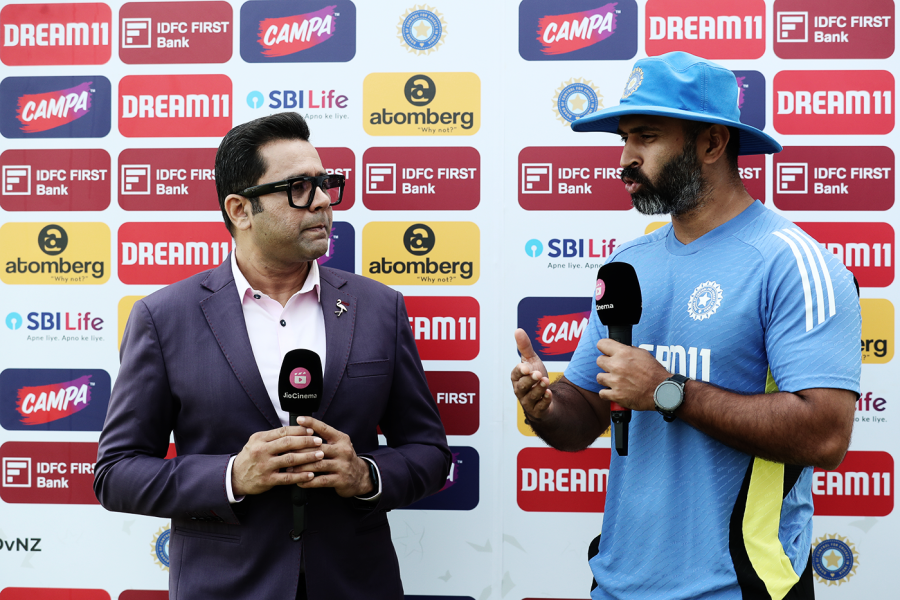
But a lot of people will mock you, troll you. And right now, there is a huge fan following for individual superstar [players]. How does trolling affect you?
It used to affect me a lot. I would react [but] always kept it elegant, in a sense. If it is possible, you respond with a lot of grace. But as you go along, you realise that you cannot ever win against a mob. Sooner or later, you will have to withdraw. And if you have to withdraw ten tweets later, might as well not start something. I think it's the maturity that comes with age, where you say, I do not want this conflict.
But does it have an impact?
Yes, it does sometimes, when it is unfair, abusive. I do not abuse in general, even as a cricketer. So when somebody is abusing, I find it very difficult to totally ignore it. Even though people say: do not block people, I block, because I feel this is like my little house. You are invited. But if you are going to abuse me, then I am going to lock the door. That is my mechanism. I block and I move on. I am very civilised in my language, so please be civil. That is all I want.
Does it still hurt?
It does not. It has never weighed me down. It may have hurt me a little when they go after your family. Only twice did I have to really shut down comments because it started with me, then it went to my wife, then kids. I said: This is it. This is not allowed. I mean, I cannot block 5000 people, so the best thing is to block comments.
Even now, I am more regular on certain platforms and I stay slightly guarded on a different platform, because I have understood there is more toxicity here, there is less toxicity there.
If I have created Akaashvani and I have put it on YouTube, there might be a few abusive [comments], but most people are commenting okay. The problem is that in a ten-minute video, you can always explain every single point of view. But when you are trying to put out a thought in three lines, it just triggers a certain fan base and then they go after you.
 "I realised very early that I don't have the temperament to be a coach. I like tactics more than technique now, so tactically, I'd love to be involved in active cricket, but I've got my content thing"
"I realised very early that I don't have the temperament to be a coach. I like tactics more than technique now, so tactically, I'd love to be involved in active cricket, but I've got my content thing"

How do you assess how viewership has changed? How people are triggered now versus say how they were six-seven years back? And how does that affect how you put out content?
You need to understand what your audience really wants from you. You do experiment and course-correct. For example, I tried doing historical pieces and I realised there is no traction. Then you have to junk it, however much I liked them. But I do not create content for myself.
If I am making content, I am making it for somebody else. Understanding content is important. But hero-worshipping [of players] is what leads to a lot of abusive comments and reactions. You know there is a certain fan following there. You do not fall into the trap of actually appeasing that fan following, but you can always fan that fire. Something that [earlier] I would not possibly touch upon as rigorously, now I may want to dedicate a piece of content [to it], because I know there is an audience that is deeply invested in this particular topic or player. I will still present [all] four sides and if I still have an opinion, if I do not agree with this, this, this, I will say that, but [only] in a ten-minute video, so that I have presented everything I want to present and then it should not be a case of taking things out of context.
Do you still enjoy what you do?
I love it. It is beautiful. I still enjoy doing it. It has never been a burden. I have created content even when I had Covid. The greatest thing is that I have not worked a day in my life, in that respect. I played. And then [cricket] became my career. I mean, how blessed can one be to actually make a career out of it?
Were you a chatty, talkative team-mate when you played for India?
I used to talk a lot on the field as well, because I felt that was my duty.
As a batter, I'm not going to succeed every single time, and the only way a batter can contribute on the field is by taking catches, fielding well, and then just to keep talking, keep shouting: well played, well done, well bowled. And if you're close-in, then try and annoy the batter.
I'm trying to help my bowler. I may not have been very good at it. Again, language wasn't my greatest ally at that point in time. Otherwise, I would have sledged better! But I had to keep chatting, because what else am I doing there otherwise? Just standing and not contributing. I'm not bowling, so the only thing I can do throughout the day is to shine the ball well whenever it comes to me and just chat.
Chopra with fellow broadcaster Jatin Sapru on the boundary line of the India-England Test in Visakhapatnam, 2016
Deepak Malik / © BCCI
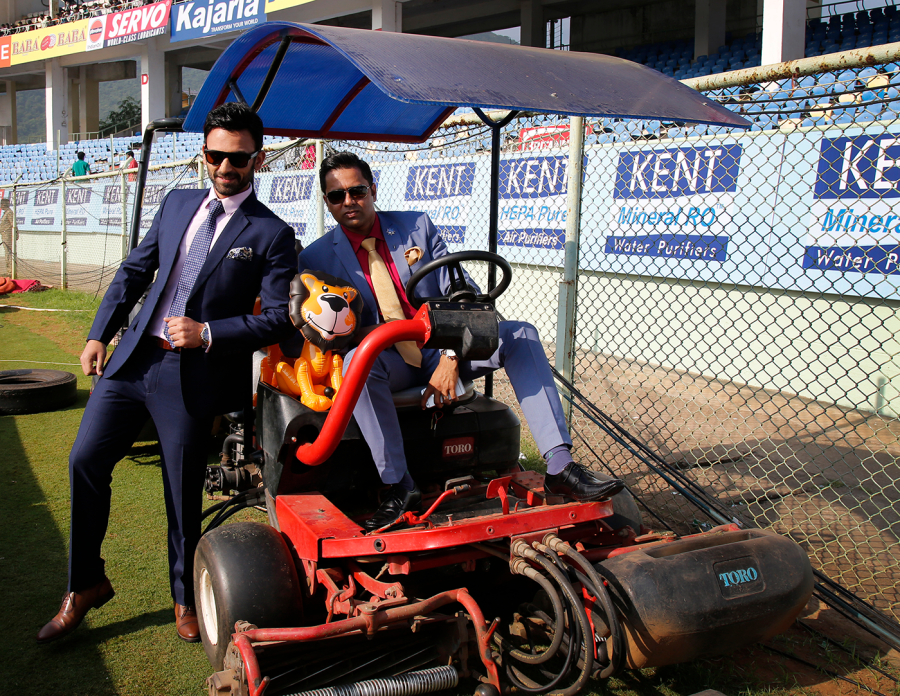
When you meet former team-mates in the commentary box, what's the dynamic like? Cricketers have their own egos of: I played so much versus him and he's commenting on someone who has played so much.
The people I played with, I'm sure there was a time in between where they must have felt a little cheated and betrayed that, yeah, he played with me and now he's criticising me [on commentary]. It is his duty to not do it. Maybe I would have felt the same way as well: if I'm going through a bad patch, be sympathetic towards me because I'm your friend.
But I took a very different course where I was trying to be as honest as possible, as analytical as possible, because I was trying to make a career for myself. There's one thing that our dear friend Sanjay Manjrekar [former India batter and current commentator] actually told me right at the beginning and it just stayed with me: "You have to be loyal to your audience. Everybody else does not matter."
I tried to do that. At that point, I'm pretty sure some people must have felt "He's crossed the line there." And there are incidents of people reaching out - not directly - and saying: No, I didn't like what you said. I got a message [via someone] once that, "Aakash, this has not gone down really well." But as a young broadcaster, I couldn't care less.
I may be a little more sympathetic now with a younger generation, because as you grow older, you get a slightly broader perspective that this could be said differently and still mean the same. At that point, I didn't have those filters. Now I understand I can say things in a slightly better fashion.
I could have been perceived as bitter - that he is doing this because he played so little and that is why he's taking it out [on me]. I hate that argument. I've seen it many a time from people who are trying to troll you. They will screenshot your cricket profile. I said: Okay, fine, that's the only problem that you have with my opinion, right? My stats [as a player]? Other than that, my opinion is fine?
Once I got a text where the man wasn't very happy about what I said, actually on this platform [ESPNcricinfo]. So I asked him: Have you watched the entire thing? I was not trying to pacify, but I wanted it to be very amicable. The guy said: "I don't watch." [But] if you have not watched, I can't do anything about it.
 "People trying to troll you will screenshot your cricket profile. I said: Okay, fine, that's the only problem that you have with my opinion, right? My stats? Other than that, my opinion is fine"
"People trying to troll you will screenshot your cricket profile. I said: Okay, fine, that's the only problem that you have with my opinion, right? My stats? Other than that, my opinion is fine"

What would your message be to active cricketers about a pundit when he has to make a critical comment?
Don't take us seriously, man. See [as a commentator], you are reacting to an incident, a situation. You're being as honest as you can. You can be wrong. My opinion can be absolutely wrong. But that opinion I am really honest about at that point in time. That opinion can also change in a week's time.
You do something else and I might change [my opinion], so don't take me that seriously. I am just reacting to that one thing. I have an opinion on it. You don't agree with it, it's absolutely fine. Why are you even bothered by my opinion? You should do what you're doing. If you're very good at it, I'm going to praise you any which way.
Have you managed to maintain friendships that you had during your playing days? Or is cricket not a big part of your social life?
It is not, actually. Firstly, I have a very limited social life to begin with. I'm a very, very private person. But there are people - like Ashish Nehra is a good friend. I can pick up the phone and we can talk for an hour. We were at Sonnet together. Same with Narender Negi, who was again with me as a kid at Sonnet. He's the fielding coach at Gujarat Titans. Those are old friendships.
Other than that, I get along very well now with everyone. And I think that has a lot to do with who I am right now. I may have been a very different person about ten years ago. That is one thing that has changed for the good. I'm a better person. I may not have been that great a person at that point in time, where you could be repulsive, someone who's not very nice, mean and nasty. I was like that. I was an activist to begin with. And then I realised that you don't have to be an activist to just speak your mind.
Any regrets? Do you ever doubt the content you put out?
I generally detach from the content the moment I put it out. I don't go back and watch anything I've done.
Chopra with India coach and fellow opener Gautam Gambhir, who was his Delhi team-mate and who replaced him in India's Test team in 2004
Arjun Singh / © BCCI
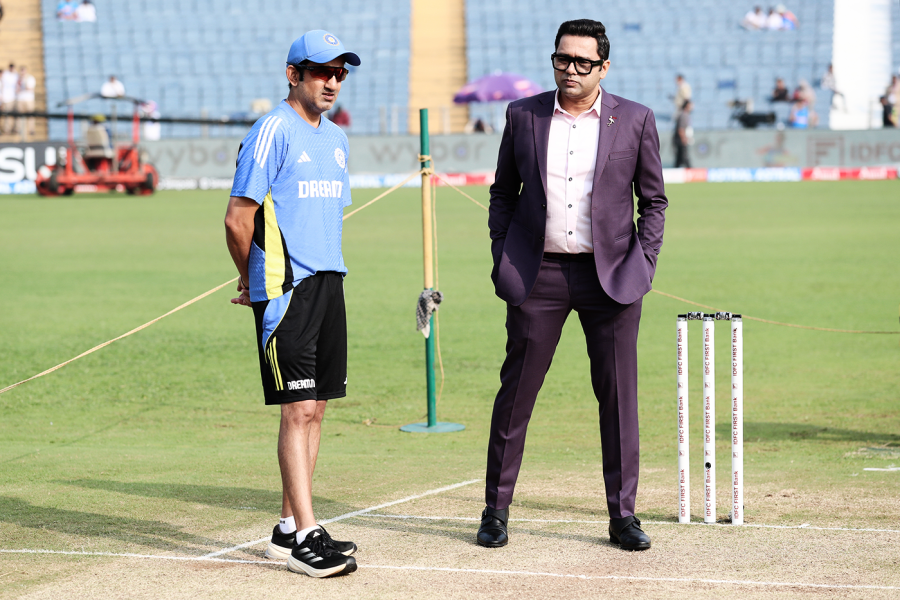
Will you always see yourself now as a media or content creator? You did your coaching course, but you haven't explored other aspects of the retired cricketer's life?
I think I'll just keep doing this. I realised very early that I don't have the temperament to be a coach. It's bizarre! I like tactics more than technique now, so tactically, I'd love to be involved in active cricket, but I've got my content thing. It will take a back seat [if I pursue other things] and I cannot allow that to happen because it has taken a very long time and a lot of hard work for it to come to where it is right now.
What's been your proudest moment in broadcasting?
This happened in Pune. We were covering a Test, I think India-South Africa. There was a 30-foot big poster man with a huge picture [of me].
And I was like, wow. There are people who are scoring runs, taking wickets, and India won. But [You see] that and you have tears in your eyes. They had put some lines and there is a huge picture. I mean, that's all that you actually work for in the end. Because as I earlier mentioned, you do not create content for yourself. So if they liked it, appreciated it, that's more than enough.
What about the proudest moment if we include your playing career?
Playing for India would be the proudest moment, obviously, because why do you start playing cricket? You start for the love of the sport, but then very soon you realise that there is a destination attached to your passion. That destination is playing for India. After that, those destinations keep changing: ten Test matches, 50, 100, so many centuries, so that pursuit is never-ending.
To be fair, if I hadn't played for India, I wouldn't be doing this right now. Not every India cricketer will end up in this position or this profession, but if you've not played for India, then it is that much tougher for you to cut it in the media, because, like it or hate it, there is a little cozy club where, if you have played cricket, they allow you entry, at least a foot in the door. Otherwise, you won't get that also.
Raunak Kapoor is deputy editor (video) and lead presenter for ESPNcricinfo. @RaunakRK
© ESPN Sports Media Ltd.
